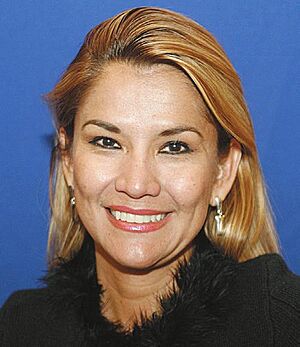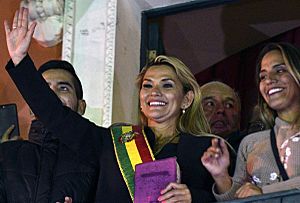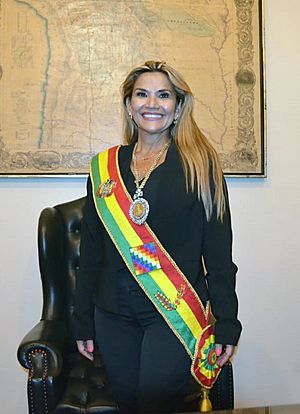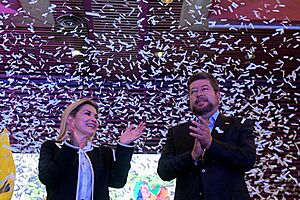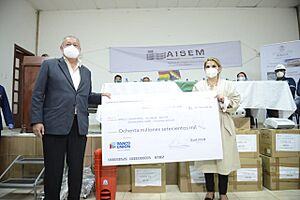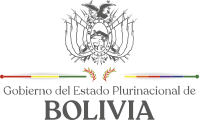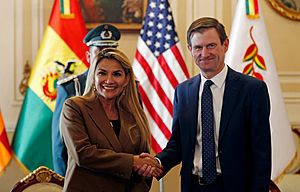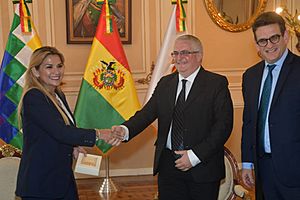Jeanine Áñez facts for kids
Quick facts for kids
Jeanine Áñez
|
|
|---|---|
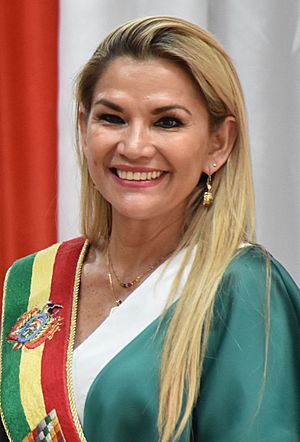
Áñez in 2020
|
|
| 66th President of Bolivia | |
| In office 12 November 2019 – 8 November 2020 |
|
| Vice President | None |
| Preceded by | Evo Morales |
| Succeeded by | Luis Arce |
| President of the Senate | |
| In office 12 November 2019 |
|
| Preceded by | Adriana Salvatierra |
| Succeeded by | Eva Copa |
| Second Vice President of the Senate | |
| In office 18 January 2019 – 12 November 2019 |
|
| President | Adriana Salvatierra |
| Preceded by | María Elva Pinckert |
| Succeeded by | Carmen Eva Gonzales |
| In office 19 January 2015 – 20 January 2016 |
|
| President | José Alberto Gonzáles |
| Preceded by | Jimena Torres |
| Succeeded by | Yerko Núñez |
| Senator for Beni | |
| In office 18 January 2015 – 12 November 2019 |
|
| Substitute | Franklin Valdivia |
| Preceded by | Donny Chávez |
| Succeeded by | Pablo Gutiérrez |
| In office 19 January 2010 – 10 July 2014 |
|
| Substitute | Donny Chávez |
| Preceded by | Mario Vargas |
| Succeeded by | Donny Chávez |
| Constituent of the Constituent Assembly from Beni circumscription 61 |
|
| In office 6 August 2006 – 14 December 2007 |
|
| Constituency | Cercado |
| Personal details | |
| Born |
Jeanine Áñez Chávez
13 June 1967 San Joaquín, Beni, Bolivia |
| Political party | Social Democratic Movement (2013–2020) |
| Spouses |
Tadeo Ribera
(m. 1990, divorced)Héctor Hernando Hincapié |
| Children | 2, including Carolina |
| Alma mater |
|
| Occupation |
|
| Signature |  |
Jeanine Áñez Chávez (born 13 June 1967) is a Bolivian lawyer and politician. She served as the 66th president of Bolivia from 2019 to 2020. Before becoming president, she was a senator for the Beni region. She also worked as a television presenter.
Áñez was a member of the Social Democratic Movement. She served two terms as senator from 2010 to 2014 and again from 2015 to 2019. During her time in the Senate, she held leadership roles, including briefly serving as president of the Senate in 2019. Earlier in her career, she was part of the Constituent Assembly from 2006 to 2007.
Early Life and Career
Jeanine Áñez was born on 13 June 1967 in San Joaquín, a town in the Beni region of Bolivia. She was the youngest of seven children. Her parents were both teachers. Áñez grew up in a rural area where basic services like paved roads and consistent electricity were often missing. Despite these challenges, she remembers her childhood as "beautiful" and "very free."
She attended the 21 August School, an all-girls school where her mother was the director. After high school, Áñez moved to La Paz to study secretarial work. She later moved to Santa Cruz to continue her education, taking courses in computing and English. She then studied law at the José Ballivián Autonomous University of Beni in Trinidad, where she earned her law degree. She also has diplomas in public management, human rights, and higher education.
Before entering politics, Áñez worked in regional television and radio journalism. She loved this work, even though it didn't pay much at first. She became a news presenter and later directed the Totalvisión TV station in Trinidad. During this time, she became an early supporter of the autonomist movement. This movement wanted to give more power to Bolivia's regions, allowing them to make more decisions about their resources and elect their own leaders. Áñez was part of this movement from the beginning, which was very important in eastern Bolivia in the early 2000s.
Constituent Assembly
Joining the Assembly
In the mid-2000s, Bolivia was going through many social changes. Jeanine Áñez became known as a politician from the lowlands who supported more regional independence. Many experienced politicians were busy with other elections, so the 2006 Constituent Assembly elections offered a chance for new professionals to enter politics. Áñez was invited by the Social Democratic Power (Podemos) group to represent Beni in the Assembly. She and her running mate, Fernando Ávila, won their district.
Time in Office
The Constituent Assembly began its work in Sucre on 6 August 2006. Áñez was very hopeful that the new constitution would include regional independence. However, she soon became frustrated by delays in the process. Articles needed two-thirds support to be approved, which made things slow. During her time in the Assembly, she worked on commissions related to the organization of the state and the justice system.
Chamber of Senators
First Term (2010–2014)
2009 Election
After her time in the Constituent Assembly, Áñez stayed involved in politics. She worked closely with Beni's leader, Ernesto Suárez. They supported creating a united group to challenge the Movement for Socialism (MAS-IPSP) in the 2009 elections. This led to the creation of the Plan Progress for Bolivia – National Convergence (PPB-CN) alliance. Áñez was chosen as their candidate for second senator for Beni. This made her one of the few former Assembly members to continue a political career at the national level.
Serving as Senator
In January 2011, the Senate's leadership board was renewed. Áñez was nominated for second vice president. However, there was disagreement among the opposition, and another senator from her group, Gerald Ortiz, also ran for the position. The opposition could not agree, so the MAS party ended up deciding. Ortiz became second vice president, and Áñez was elected second secretary, but she refused the post. She felt the MAS was supporting disloyal members of her party.
In 2014, during her last year in her first term, Áñez was again involved in disputes within the opposition. She was nominated for second secretary, but internal conflicts prevented her from getting the position.
Second Term (2015–2019)
2014 Election
During her first term, Áñez became involved with the political group of Santa Cruz Governor Rubén Costas. This group later became the Social Democratic Movement (DEMÓCRATAS; MDS). By early 2014, Áñez had joined the Democrats. The Democrats and the National Unity Front (UN) formed the Democratic Unity (UD) coalition. Áñez was chosen to run for reelection as senator for Beni.
She resigned her Senate seat on 10 July to qualify as a candidate. Her substitute, Donny Chávez, took over her seat. In the elections on 12 October, Áñez was reelected as senator for Beni.
Serving as Senator
Unlike her first term, the process to form the Senate's leadership board in 2015 went smoothly. Áñez was elected second vice president of the Senate. In January 2019, she was asked to take on the role of Second Secretariat. However, she chose to exchange it with Senator Víctor Hugo Zamora for the "more comfortable" second vice presidency, which was mostly a ceremonial role.
Presidency (2019–2020)
Becoming President
On 10 November 2019, after weeks of protests and allegations of issues in the presidential election, President Evo Morales and Vice President Álvaro García Linera resigned. Other high-ranking officials also resigned, leaving a gap in leadership.
As the second vice president of the Senate, Jeanine Áñez was the highest-ranking official left. She announced that it was her duty to become president to call for new elections. She was in Beni at the time and traveled to La Paz the next day. On 11 November, she arrived in La Paz and announced an emergency session of the Senate for the following day.
During meetings with the Catholic Church and the European Union, different political groups discussed how Áñez could become president. Some members of Morales' party, the MAS, were hesitant. They later agreed to help with the process, but then did not attend the legislative session, saying they felt unsafe.
Áñez then declared that she would assume the presidency of the Senate, based on Senate rules. From that position, she declared herself president of Bolivia, citing the Constitution which states that the president of the Senate takes over if the president and vice president are absent. Morales and García Linera had left the country, which Áñez said meant they had abandoned their duties. The entire process took about eleven minutes.
The Bible Returns to the Palace
After becoming president, Áñez went to the Palacio Quemado, the former presidential residence. She appeared on the balcony wearing the presidential sash and medal. With her children and other leaders, she gave a short speech, promising to "restore democracy." She also held a small pink Bible, saying that "God has allowed the Bible to enter the Palace again." Before 2009, Bolivia was not a secular state, and the relationship between the government and the Church had been a topic of discussion. At 52, Áñez became Bolivia's 66th president and the second woman to hold the position.
The next day, some MAS legislators argued that Áñez's assumption of power was not proper because their resignations had not been formally approved. However, security personnel prevented them from entering the Legislative Assembly. On 14 November, a Senate session with enough members approved the resignations, and Eva Copa was elected as the new president of the Senate. The MAS group later formally recognized Áñez's role as president through constitutional succession.
Reactions to Her Presidency
Many Bolivian opposition leaders welcomed Áñez's presidency. Former president Carlos Mesa congratulated her and wished her success. Members of her party, like Governor Rubén Costas, also expressed their support.
However, members of the MAS party were unhappy. From Mexico, former president Morales said that a "coup" had taken place. Other MAS leaders also used similar language, saying that Áñez's rise to power was unfair.
Domestic Policy
Responding to Unrest
Áñez's presidency began during a time of social unrest. While some groups ended their protests, others, especially those linked to the MAS, started new demonstrations. These protests were mainly in areas that supported MAS, like Chapare and El Alto.
On 14 November, Áñez issued a decree that allowed the Armed Forces to help calm the situation. This decree stated that military and police would not be held responsible if they acted in self-defense. Áñez said it was not a "license to kill," but human rights groups were concerned. They called for the decree to be removed.
Soon after the decree, there were reports of violence in Sacaba and Senkata, where protesters were killed or injured. The government denied that security forces were ordered to shoot. Áñez expressed sadness about the deaths. Due to public pressure, she removed the decree on 28 November, saying that peace had been achieved.
An international human rights group investigated the violence. They called the events in Sacaba and Senkata "massacres" and criticized the serious human rights violations. They said that deadly force should not be used to control protests and asked for an international investigation.
Electoral Policy
Calling New Elections
On 14 November 2019, Áñez announced that her government would call for new elections as soon as possible. She asked for cooperation from MAS legislators, as their votes were needed to elect new members for the Supreme Electoral Tribunal. These new officials would then organize the elections.
Initially, there was debate about whether elections could be called by presidential decree if the assembly couldn't agree. However, on 23 November, the Senate approved a law for new elections, which was then passed by the Chamber of Deputies and signed by Áñez on 24 November. This law canceled the 2019 elections and called for new ones, though no date was set yet. It also stated that former presidents who had served two terms could not run again, which meant Morales could not be a candidate.
Áñez appointed Salvador Romero to head the new Supreme Electoral Tribunal (TSE). The assembly then elected six more members. On 3 January 2020, the TSE announced that the new general elections would be held on 3 May.
However, the COVID-19 pandemic caused delays. The TSE asked for the elections to be postponed to 6 September. The legislature approved a law delaying the election to 2 August. Áñez objected, saying it was too risky to have millions of people vote during a pandemic. The legislature rejected her objection, and the law was passed. Later, the TSE negotiated with political parties and set the elections for 6 September. Áñez approved this.
Due to the ongoing health crisis, the TSE again postponed the elections to 18 October. This decision was supported by Áñez and most parties, except the MAS. MAS supporters protested, causing roadblocks and food shortages. Áñez threatened to use police and military to stop the protests. Eventually, the protests ended, as they were not popular with many Bolivians.
Presidential Campaign
Initially, Áñez said she had no plans to run for president, stating her goal was to hold transparent elections. However, her party, the Democrats, began to promote her as a candidate. On 24 January 2020, Áñez announced her presidential campaign as part of the Juntos alliance. She explained that she felt forced to run to unite the opposition against the MAS.
Her decision was met with mixed reactions. Some opposition leaders criticized her for breaking her promise of neutrality. Former president Morales said her candidacy proved that a "coup" had happened. However, Governor Rubén Costas supported her, saying it was "women's time." Samuel Doria Medina became her running mate.
Throughout the campaign, Áñez was usually in third or fourth place in polls. On 16 September, she announced she was withdrawing her candidacy to prevent the opposition vote from being split. She said it was an "honor" to step aside to prevent Morales' party from returning to power.
Despite her withdrawal, Luis Arce of the MAS won the election in the first round on 18 October. Analysts suggested that Áñez's decision to run, and her government's actions, contributed to the opposition's loss.
COVID-19 Pandemic Response
When the COVID-19 pandemic began, Áñez's government put in place various safety measures. On 17 March 2020, Bolivia closed its international borders to foreigners. Within days, all international and national flights and land transport were suspended, except for goods. Workdays were shortened, and a curfew was set.
On 26 March, Áñez declared a health emergency and imposed a strict, mandatory quarantine. People were allowed to leave their homes only for essential shopping during certain hours, and all exits were banned on weekends. Fines were put in place for those who didn't follow the rules. The Armed Forces and police helped enforce these measures. On 26 June, a "dynamic quarantine" was implemented, allowing local governments more control over restrictions.
To help families, Áñez and her cabinet pledged to donate half of their monthly salaries to a fund for those affected by the pandemic. The government also promised to pay domestic electricity and water bills for several months.
Cultural Policy
Since 2009, the Wiphala (flag of the Andes' indigenous peoples) has been a dual flag of Bolivia, alongside the national flag. Áñez's government kept the Wiphala as a national symbol. Her government also made the flag of the Patujú flower, a symbol of eastern Bolivia's indigenous peoples, an official flag for national events. In January 2020, Áñez introduced a new government logo that included the national coat of arms, the tricolor flag, the Wiphala, and two Patujú flowers.
To free up funds for the pandemic, Áñez abolished three ministries on 4 June, including the Ministry of Cultures and Tourism and the Ministry of Sports. These were merged with the Ministry of Education. This decision caused some concern among indigenous groups, but Áñez said that art and culture would still be promoted through the Ministry of Education.
Foreign Policy
Israel
On 28 November 2019, Áñez's foreign minister announced that Bolivia would seek to restart diplomatic relations with Israel. These relations had been cut off in 2009 by former president Morales. The foreign minister called Morales' decision a "political measure" that ignored economic ties. Israel welcomed the news. On 11 December, visa requirements for Israeli citizens entering Bolivia were removed.
On 4 February 2020, Áñez met with Israeli officials to discuss cooperation in areas like agriculture, education, and health. Soon after, the government announced the formal return of relations between Bolivia and Israel.
United States
Diplomatic relations between Bolivia and the United States had been suspended for 12 years. Áñez's government worked to improve these ties. On 26 November 2019, an ambassador was appointed for a special mission to the U.S. government. In December, Áñez also removed visa requirements for American citizens entering Bolivia. On 21 January 2020, Áñez met with U.S. Under Secretary of State David Hale, and they agreed to exchange ambassadors again.
Venezuela
Within two days of taking office, Áñez's government recognized opposition leader Juan Guaidó as the legitimate president of Venezuela. The next day, diplomats representing Nicolás Maduro's government were asked to leave Bolivia. Bolivia also left the Bolivarian Alliance and the Union of South American Nations. On 22 December 2019, Bolivia officially joined the Lima Group, a regional group focused on finding solutions to the situation in Venezuela.
Post-Presidency (2020–2021)
Áñez was not present for her successor's inauguration. On 7 November 2020, she announced she had returned to her home in Trinidad, Beni. She promised to continue defending democracy and denied rumors that she planned to leave the country.
Beni Gubernatorial Campaign
On 27 December 2020, Áñez announced she was leaving the Social Democratic Movement. She criticized "old politicians" from both sides for hindering her government and said that "a change is needed" in politics.
The next day, it was announced that Áñez would run for governor of the Beni Department as part of the Ahora! alliance. She officially launched her campaign, saying she chose to work for her department instead of retiring from politics.
Her campaign focused on developing Beni's agriculture and providing a "Beni Bonus" to help families during the pandemic. Early polls showed her with good support. However, her campaign was affected by legal issues. In the end, she came in third place in the election.
Personal Life
Áñez was married to lawyer Tadeo Ribera, and they have two children, Carolina and José Armando. Ribera served as mayor of Trinidad from 1996 to 1999. They divorced after Áñez became a senator because she had to move to La Paz, and he did not approve of her political career. Ribera passed away in January 2020. Áñez's second husband is Héctor Hernando Hincapié, a politician from Colombia.
Áñez is known for her love of animals. During her presidency, she adopted several stray dogs that lived near her official residence. One dog she named "Pitita," a reference to the popular protests that led to Morales' departure.
Electoral History
| Year | Office | Party | Alliance | Votes | Result | Ref. | ||||
|---|---|---|---|---|---|---|---|---|---|---|
| Total | % | P. | ||||||||
| 2006 | Constituent | Independent | Social Democratic Power | 14,677 | 45.62% | 1st | Won | |||
| 2009 | Senator | Independent | National Convergence | 85,631 | 53.15% | 1st | Won | |||
| 2014 | Social Democratic Movement | Democratic Unity | 91,855 | 51.44% | 1st | Won | ||||
| 2020 | President | Social Democratic Movement | Juntos | Withdrew | Lost | |||||
| 2021 | Governor | Independent | Ahora! | 26,620 | 13.29% | 3rd | Lost | |||
| Source: Plurinational Electoral Organ | Electoral Atlas | ||||||||||
Images for kids
See also
 In Spanish: Jeanine Áñez para niños
In Spanish: Jeanine Áñez para niños


